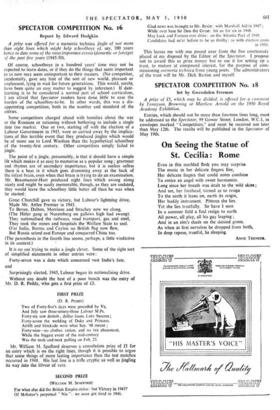SPECTATOR COMPETITION No. i6
Report by Edward Hodgkin A prize was offered for a memoria technica jingle of not more than eight lines which might help schoolboys of, say. 100 years hence to date some of the most important events (domestic or foreign) of the past five years (1945-50).
Of course, schoolboys in a hundred years' time may not be expected to learn dates, or if they do the things that seem important to us now may seem unimportant to their masters. (No competitor, incidentally, gave any hint of the sort of new world, pleasant or unpleasant, lying in wait for future generations. This would, surely, have been quite an easy matter to suggest by inference.) If date- learning is to be considered a normal part of school curriculum, I am afraid that Spectator readers have done little to ease the burden of the schoolboy-to-be. In other Words, this was a dis- appointing competition, both in the number and standard of the entries.
Some competitors charged ahead with homilies about the war or the Russians or rationing without bothering to include a single date (no marks). One or two, starting off with the election of a Labour Government in 1945, were so carried away by the implica- tions of this terrible event that they produced jingles which would be of more use to Lord Woolton than the hypothetical schoolboy of the twenty-first century. Other competitors simply failed to jingle.
The point of a jingle, presumably, is that it should have a simple lilt which makes it as easy to memorise as a popular song ; grammar and rhymes are of secondary importance, but it is useless unless there is a beat in it which goes drumming away at the back of the infant brain, even when that brain is trying to do an examination. Mr. Beaumanoir-Hart produced eight lines which swung along nicely and might be easily memorable, though, as they are undated, they would leave the schoolboy little better off than he was when he started: Great Churchill gave us victory, but Labour's lightning drive, Made Mr. Attlee Premier in 1945.
To Bevan, Dalton, Morrison and Strachey now we clung, (The Hitler gang at Nuremberg on gallows high had swung). They nationalised the railways, road transport, gas and steel, They took the mines and hospitals the Welfare State to seal. O'er India, Burma and Ceylon no British flag now flew, But Russia seized east Europe and conquered China too.
(The parenthesis in the fourth line seems, perhaps, a little vindictive in its context.) It is no use trying to make a jingle clever. Some of the right sort of simplified statements in other entries were : Forty-seven was a date which concerned vast India's fate. and Surprisingly elected, 1945, Labour began its nationalising drive.
Without any doubt the best of a poor bunch was the entry of Mr. D. R. Peddy, who gets a first prize of £3.
FIRST PRIZE
(D. R. PEDDY) Two of Forty-five's days were preceded by Vs, And July saw three-ninety-three Labour M.Ps. Forty-six saw demob., dollar loans, Lake Success ; Forty-seven the wedding of Duke and Princess. Airlift and blockade were what Sep. '48 meant ; Forty-nine—no clothes ration, and no tax abatement, While the biggest event of the mid-century Was the neck-and-neck polling on Feb, 23.
Mr. William M. Spafford deserves a consolation prize of £1 for an entry which is on the right lines, though it is possible to argue that some things of more lasting importance than the test matches occurred in 1948. His last line is a trifle cryptic as well as jingling its way into the librest of vers.
SECOND PRIZE
(WILLIAM M. SPAFFORD)
For what else did the British Empire strive: but Victory in 1945? Of MJlotov's perpetual " Nix ": we soon got tired in 1946. Glad news was brought to Mr. Bevin: with Marshall Aid in 1947 ; While over here Sir Don the Great: hit us for six in 1948. May Luck and Fortune ever shine: on the Atlantic Pact of 1949. Candidates had ne'er before to be so thrifty: as with election costs
in 1950.
This leaves me with one pound over from the five courteously placed at my disposal by the Editor of the Spectator. I propose not to award this as prize money but to use it for setting up a trust, to mature at compound interest, for the purpose of com- missioning memoria technica from young poets. The administrators of the trust will be Mr. Dick Barton and myself.






































 Previous page
Previous page